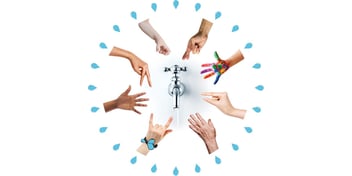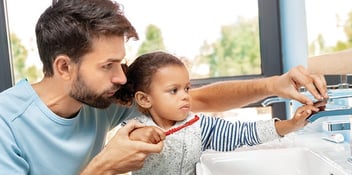The organisation improving water literacy across Australia
Smart Approved WaterMark is making waves in water literacy around Australia with an array of educational programs and experiences designed to help Aussies love water. As part of Water Source’s expert series, CEO Chris Philpot discusses the research behind the not-for-profit’s approach to water literacy and how to help communities use water wisely, now and in the future.
Smart Approved WaterMark is all about helping communities use water efficiently. In 2019, we conducted research into Australia's relationship with water at the residential level.
The research was a combination of qualitative and quantitative. We had a sample size of 2500 people across Australia. We asked questions to test their water literacy, as well as questions around how they use water in the home: how many times they think they touch their taps, use their showers and use water for washing dishes, for example.
The results that came back were really quite interesting. We found that most people take water for granted and use it very subconsciously, even though it's such an essential resource. It's not until there's a water shortage or a mains break in the street that most people realise they can’t live without it.
We found that national levels of water literacy were very low across Australia, particularly among the younger generations. However, we also found that once somebody improves their level of water literacy, once they understand how water gets to their home, they become a lot more appreciative of the resource and value it more, and they want to use it more efficiently and more wisely. The research also revealed that water deprivation experiences are a catalyst for understanding, too.
This research helped us develop our "Three E" strategy: education + experience = endearment. When someone is given the opportunity to learn about the value of water, backed up by a direct experience with water deprivation, they develop a much more robust appreciation for the resource. This insight has become a key focal point of Smart Approved WaterMark’s strategy in terms of the programs we develop.
Welcoming Water Night
In 2020, we launched Water Night, which was first held during National Water Week this past October. We asked participants to stop touching their taps and only use water from a bucket for one whole evening. It was a huge success and has now become an annual event.
We have findings to show that Water Night increased levels of water literacy, increased the way people valued water and inspired them to use it more wisely. Water Night is about inviting people into the experience side of the equation, but having an experience opens people up to education. It’s an opportunity for people to stop and really think about water and how they use it.
Moving forward, we are now delighted to be offering another water literacy program, this time designed specifically for kids and is also a direct result of our research findings around the Three Es.
Walter Smart and Friends is an immersive theatrical experience for primary school children. We partnered with Gibber Educational, a company that specialises in theatre for schools. Essentially, the program involves performances and workshops that cover water supply treatment, water efficiency and water-wise behaviours.
Walter Smart and Friends is very much linked to the education side of the Three Es, but also aims to provide experience to primary school children through a very fun and engaging pantomime-style performance. From an education perspective, the script is closely linked to the Australian curriculum for science and HASS (human arts and social science), and links perfectly with the emphasis on sustainability as a priority for study across all learning areas and subjects.
Reaching younger generations
The program is very much delivered as an incursion for primary schools, linked to the curriculum and what teachers are delivering in class to support key learnings. The performance is followed up by a workshop, which is designed specifically to test students' knowledge of what they've learned during the performance.
The actors are dressed up in fun costumes; they engage with the children, getting them involved. While Walter Smart is the star of the show, there are a range of different characters involved that use water differently in different parts of the home. It’s engaging and fun; we’re really proud of the program and how excited the kids get during the performance and workshops.
Kids are a great opportunity to change future mindsets around water. Our research revealed that, as you get to younger and younger generations, both the knowledge and the value that people place on water diminishes. Younger people tend to have lower levels of water literacy and are more wasteful in the way they use water. Older generations are still very savvy and keen to conserve.
But, by focusing on primary school–aged children, we’re hoping to develop that understanding of water early on so they grow up with a better appreciation of how important water really is. The aim is to change behaviour through motivating our kids and helping them feel great about making positive changes in how they use and save water. We've just completed our first program delivery in South-East Queensland, with Unitywater funding the delivery of the program to no less than 20 primary schools.
[embed]https://vimeo.com/571109533[/embed]
Beginning a journey
While Water Night and the Walter Smart and Friends programs are one-off experiences and educational platforms, we’ve been working on ways to follow through on these water literacy opportunities and support Australians in their water literacy journey.
Once a household signs up to Water Night, they receive fact sheets and information on how to save water, and where their water comes from, and how it gets to their home. But we also have Smart Water Advice, a subscription-based program aimed at helping water utilities and councils deliver water saving resources to their communities.
There’s a huge amount of digital and offline water efficiency collateral available through the program that can be tweaked and rebranded for the local water utility to use. We have about 65 subscribers in Australia at the moment.
We believe it's really important to make sure that all water service providers have the support they need in terms of educating their customer base in water conservation. And that's exactly what Smart Water Advice is designed to do.


